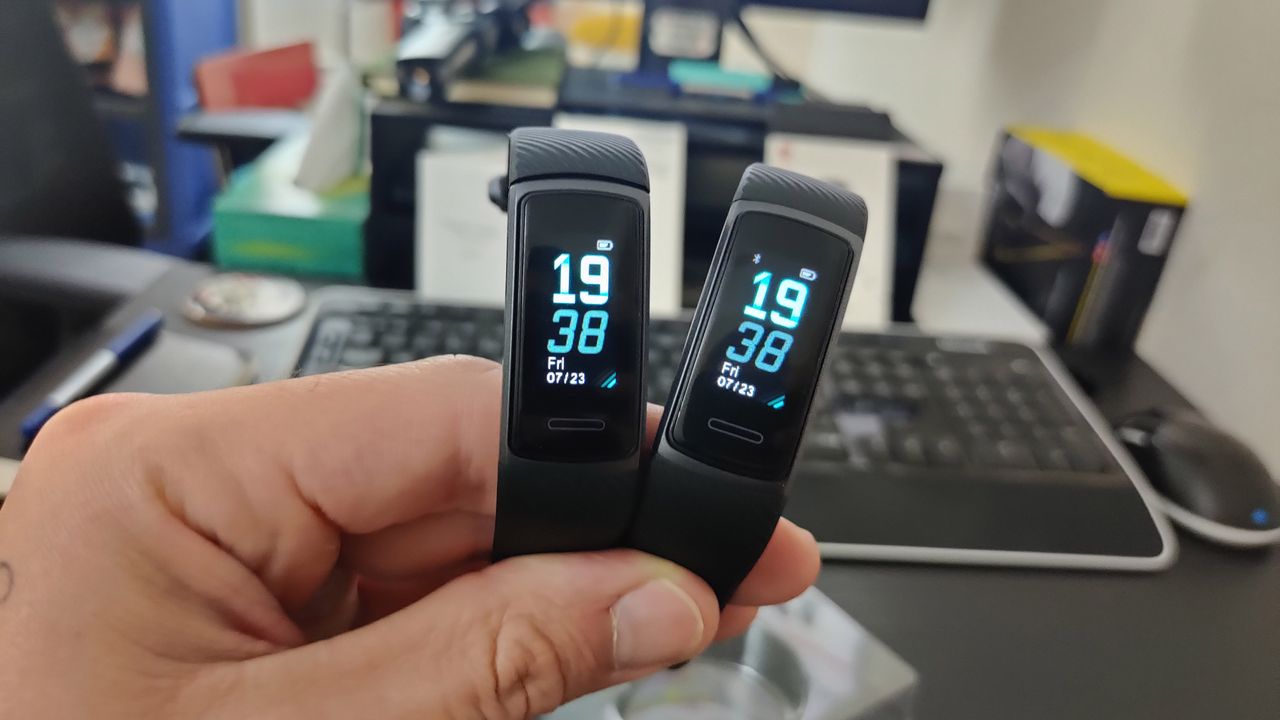

I knew it'd come to this. T3 lured me in with the idea of being able to test all the best running watches and best fitness trackers but it was only a matter of time before the bait-and-switch happened. And the time came when I was asked: 'Matt, would you want to test and review the three best-selling Amazon fitness trackers?'
I, gullibly, agreed and took on the not-so-noble task of analysing fitness wearables that cost less than a large takeaway pizza. As matter of fact, the price of the three trackers in question combined costs less than a Fitbit Inspire 2, and that's not even the best Fitbit.
After a few weeks of testing the finest Letscom and Teminicer have to offer, I think I have a firm understanding of what people would be up against, should they decide to buy these fitness bands. Without spoiling my verdict too much, I hope no one buys these trackers expecting to have their minds blown. Sure, the Teminice band has a 4.3-star rating (out of 5) on Amazon, based on almost 21,000 reviews, but that says more about the reliability of Amazon reviews than the tracker itself...
Nevertheless, it would unfair of me to just say 'these fitness trackers are awful' so I'm not going to do that. But should you buy any of them if you want to improve your fitness level or track everyday activity? Without further ado, let's see how these fitness band perform.
Letscom Smart Watch ID205L review
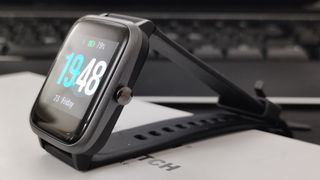
Price: Currently sold out but was £25
Stats: TFT LCD colour screen, 210 mAh Li battery, charging time – 3 hours
The Letscom Smart Watch ID205L is a Fitbit Versa 3-esque fitness watch that comes in an Apple Watch-like box. It's the best looking of the tested fitness trackers, although it does feel cheap on your wrist – very plasticky – and is far from being the most competent fitness band I've ever tried.
Sign up to the T3 newsletter for smarter living straight to your inbox
Get all the latest news, reviews, deals and buying guides on gorgeous tech, home and active products from the T3 experts
On the positive side, the Letscom Smart Watch ID205L has a functioning and bright touchscreen that's not too laggy either: good start. The actual display is a lot smaller than the watch face – bezel lovers will be in heaven – but not so small that you can't work out what's going on. You can kind-of make out the edges of the display on the picture above.
The button on the side of the watch looks like an Apple Watch-style crown but it's actually just a button: it can only be pressed, not turned. Since this a touch-enabled device, it's not likely you will use the button too much so it's not a great loss. The strap is soft but doesn't radiate quality, which is not surprising, given the low price point: some (a lot of) corners were obviously cut.
The heart rate sensor at the back of the Letscom Smart Watch ID205L is the same as the ones on the fitness bands below but rotated 90 degrees. Heart rate average was not terribly off during runs although it just showed me a flat 90 bpm when doing strength workouts. It's cool that this watch has multiple smart modes, but it's not much use if the sensor doesn't work in some of them.
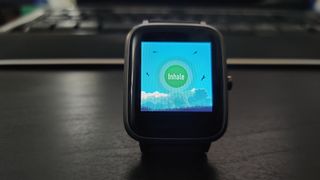
The Letscom Smart Watch ID205L has connected GPS and it takes a while for the fitness tracker to connect to the phone and, naturally, drains the battery more. General accuracy for distance and speed isn't terrible, but the VeryFitPro app – see below – is not the greatest when it comes to analysing your runs. There are a few activity summary widgets available on the watch including steps taken, calories burned and distance travelled.
The battery life is not bad. I wasn't using the watch excessively but I didn't usually have to charge it more than once a week. If you use the GPS or keep the screen on often it falls off, however.
The sleep tracking feature on the Letscom Smart Watch ID205L wasn't too bad either, although the data collected from it does not appear in the VeryFitPro app, so you can't easily see how it changes and develops over time.
Additional functionality here includes a relax timer, general timer and music controls – all very basic. My favourite bit was the question the watch asked me when I aborted a relax session: "Confirm the end of this relax?" Sure.
In conclusion, the Letscom Smart Watch ID205L isn't a terrible fitness wearable but it's still far from being something I'd recommend to people.
Interestingly, this watch – like the other two reviewed here – are currently sold out. This might seem like a problem, but it's not, because if you look on its Amazon page you will see a load more watches that appear to be almost exactly the same as it. Hmm.
VeryFitPro App review
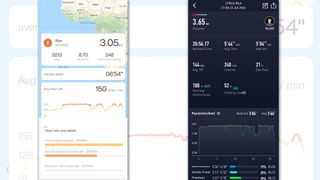
Left: VeryFitPro workout summary, right: Coros App workout summary
Letscom Smart Watch ID205L uses the amusingly named VeryFitPro to store your stats and let you choose your settings. Conveniently, VeryFitPro also does the same thing on the other Letscom tracker and on the Terminice one, so all my comments here apply to all three devices.
Companion apps are almost as important as the fitness wearables themselves and the VeryFitPro app is on par with the trackers in terms of performance. And what I mean by that is that it's pretty basic.
Just like the bands, the main appeal of the VeryFitPro app is that it's super simple. The home page displays your daily stats – activities, sleep and heart rate – while the 'Details' page provides an overview of the same stats but for a longer period – week, month, year. You can change wearable settings on the 'Device' page and set targets/change personal info on the 'User' page.
Compared to other companion apps such as those from Fitbit, Garmin and Coros, you miss out on a lot clarity that might help you better understand your health stats. I couldn't find a way to analyse older data in a meaningful way. You can't check previous sleep data either.
There is also no extra content around anything in the VeryFitPro app – no blog, workouts, or explainers – nor is there a community to interact with. There is no gamification in the VeryFitPro either: you can't collect badges and unlock different trophies by hitting certain milestones.
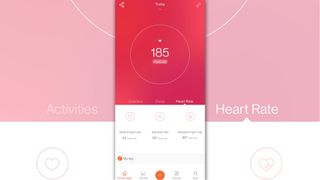
Another thing I found 'interesting' was the fact that the watch was tracking and displaying heart rate in the app even when I wasn't actually wearing the watch. The screenshot above was taken with the watch sitting on the table in front of me, measuring the heart rate of the air.
You can't expect VeryFitPro to show you much data, considering the wearables themselves don't collect that much information in the first place. You miss out on things such as stress tracking, SpO2 level monitoring, advanced sleep tracking, different workout modes, all of which are offered by more advanced/expensive bands.
These all add to the overall fitness wearable experience, especially if your goal is to improve your health and fitness level. The Letscom and Terminice wearables I tried out aren't amazing in their own right, but they are still let down by this app.
Letscom Tracker ID152 review
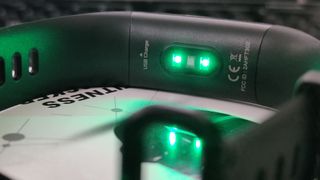
The green lights of the optical heart rate sensor often flashes up, even when the tracker isn't on the wrist
Price: Currently sold out but was £20
Stats: 0.96-inch TFT-LCD screen, 90mAh Li battery, charing time – 2 hours
It's true that when compared to more capable bands, such as the Honor Band 6 or the Garmin Venu 2, the Letscom Tracker ID152 performance is less than stellar, but this fitness tracker is not completely without merits.
For one, it has an 'up to' 10 days battery life, probably helped by the smallish display and It's also pretty lightweight, not to mention it has an IP68 water rated case. The user interface is simple – but perhaps a bit too simple, particularly if you've ever tried a more expensive fitness tracker before.
The Letscom Tracker ID152 is not a touchscreen wearable, unlike more illustrious fitness trackers: there is only one capacitive touch button under the display. The only way to interact with the fitness band is to short/long press this sad little button. No swiping, people!
Tapping the button once will cycle through the basic menu options, long pressing it will start/finish workouts: that's it. The widget views available on the tracker are: watch face, step counter, heart rate, walk (sport mode), run (sport mode), bike (sport mode), stopwatch and... that's it.
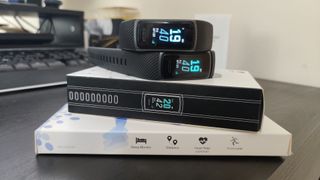
Twin towers: Letscom Tracker ID152 vs Teminice Fitness Tracker ID152
I couldn't find a way to change any setting on the watch or to check old activity data either, such as run history etc. There is no way of turning the tracker off either, surprisingly.
Speaking of running: during the run workout test, the average heart rate reading from the Letscom Tracker ID152 wasn't far off from the one gathered from the COROS Pace 2, the latter which is an accurate running watch in my experience. Better still, both heart rate graphs looked kind-of similar: not too shabby!
The Letscom Tracker ID152 has no built-in GPS but it can connect to your phone's GPS in a similar way to older Fitbits do. However, when running without the phone, I found that the pace and distance data were waaaaaay off, which is to be expected, considering the price.
Another thing I noticed is that the workout data fields – e.g. current heart rate – are way too small to read when you're working out, especially outdoors. The lack of screen contrast doesn't help either when trying to work out what's going on the fitness tracker during exercising.
For reference, take a look at the image at the top of the page: you can hardly read the display and it wasn't even a very sunny day when I took that photo. My face resembled that of Ken Jeong's on that tiny text gif when trying to read my real-time stats during running.
Teminice Fitness Tracker ID152 review
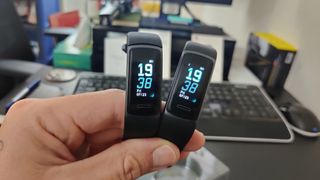
Left: Letscom Tracker ID152, right: Teminice Fitness Tracker ID152 (or is it the other way around?)
Price: Sold out but was £23
Stats: 0.96-inch TFT-LCD screen, 90mAh Li battery, charing time – 2 hours
Being fairly unfamiliar with the world of cheap trackers on Amazon, I was a bit taken aback to discover the Teminice Fitness Tracker ID152 and the Letscom Tracker ID152 are literally the same device. They look the same, use the same app and just are the same thing. So everything I just said about the Letscom Tracker ID152 applies to the Teminice Fitness Tracker ID152. Perhaps I should have known this as the 'ID' number on both bands is the same.
The only difference, then, is price: the Teminice model is more expensive, or at least it was since, again, you can't actually buy the Letscom tracker at the moment. These were the top 3 best-selling fitness trackers on Amazon when we bought them, and now they're unavailable. Although you can console yourself with the fact that Teminice is now selling a very similar fitness tracker with no number at all. As with the Letscom watch there are also devices that look uncannily to the ID152 from various other brands you've never heard of.
Amazon cheap fitness tracker try-out: verdict
As expected, when you pay very little money for your fitness tracker, you get a cheap fitness tracker experience. Sure, not everyone needs a Garmin Forerunner 945 or a Polar Vantage V2 but there are less expensive fitness trackers available on the market today that provide a way more accurate and enjoyable fitness wearable experience.
Although admittedly they're not as insanely inexpensive as the ones looked at here, the Amazfit GTS 2e, Huawei Band 6 or the best cheap Fitbits cost under £100 and are much better watches with far better apps. The wider ecosystems and ever-growing communities of more expensive fitness watch brands really help motivate you more to keep getting and staying fit and healthy.
I worry that these cheapo fitness trackers will end up in landfill sooner rather than later, both because users are likely to get fed up of them and because their sheer cheapness is likely to lower their longevity on average. The carbon footprint of manufacturing and shipping these wearables must be significant, especially given they probably won't be used much.
So buying one means bringing about the demise of the planet a little faster, without even giving you the improved fitness you'll need to survive in a post-apocalyptic landscape.
My advice is to do yourself and the planet a favour by getting a decent fitness tracker or running watch. Yes it'll cost more than £20 but it will help you reach your fitness goals in a meaningful way and should last for years to come, whilst getting new software upgrades and features along the way.

Matt Kollat is a journalist and content creator who works for T3.com and its magazine counterpart as an Active Editor. His areas of expertise include wearables, drones, fitness equipment, nutrition and outdoor gear. He joined T3 in 2019. His byline appears in several publications, including Techradar and Fit&Well, and more. Matt also collaborated with other content creators (e.g. Garage Gym Reviews) and judged many awards, such as the European Specialist Sports Nutrition Alliance's ESSNawards. When he isn't working out, running or cycling, you'll find him roaming the countryside and trying out new podcasting and content creation equipment.
-
 This PS5 Pro game proves the best part of next-gen isn't what you expected
This PS5 Pro game proves the best part of next-gen isn't what you expectedRay-traced reflections might be a mirage
By Max Freeman-Mills Published
-
 Oil pulling is going viral on TikTok for stopping morning breath – but does it actually work?
Oil pulling is going viral on TikTok for stopping morning breath – but does it actually work?4 hacks that prevent morning breath, according to a sleep expert
By Bethan Girdler-Maslen Published